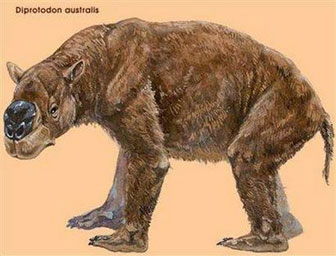Climate change, not hunters, killed ancient Australia’s giant kangaroos
Climate change, not hunters, killed ancient Australia’s giant kangaroos
University of Melbourne
August 16, 2006
Scientists at the University of Melbourne and La Trobe University have found strong evidence for the cause of the extinction of Australia’s giant marsupials some 50,000 years ago.
|
Artist’s depiction of a creature resembling a giant wombat known as Diprotodon australis. Image courtesy of University of Melbourne and La Trobe University. |
Cold, arid climates of the last ice age have been identified as a likely cause, casting doubt on the alternative hypothesis which blames human hunters.
Giant kangaroos, marsupial lions’ and wombat-like diprotodons the size of hippopotamuses roamed Australia in prehistoric times.
The largest marsupials weighted up to 2.5 tonnes – heavier than a four wheel drive car. Giant kangaroos were at least 1 m taller than the biggest kangaroos today.
“They all became extinct, with the red kangaroo the largest marsupial to survive beyond the ice age. The reason for their extinction has long been debated” said Dr Matt Cupper of the School of Earth Sciences at the University of Melbourne.
Dr Matt Cupper from the University of Melbourne and Ms Jacqui Duncan from La Trobe University revisited an archaeological site discovered at Lake Menindee on the Darling River in the 1930s where evidence of human hunting of the large animals had been argued to occur.
“By using state of the art dating techniques, unavailable to earlier archeologists, we have found strong evidence for climate change being the cause of the giant marsupials’ deaths, rather than humans as originally thought,” said Dr Cupper.
Their findings are to be published in the prestigious international journal Quaternary Research this month.
The scientific team re-excavated and dated the site in fine detail to look at the relationship between the past human occupants and giant marsupials.
“We determined that there is no evidence of humans butchering the marsupials. People were not even at the scene of the crime, with the oldest evidence of humans at the site at least 10,000 years after the giant mammals went extinct,” said Ms Jacqui Duncan of the Archaeology Program at La Trobe University
“The animals probably died of starvation during drought around 55,000 years ago,” she said.
“This is a significant find — unraveling more clues to what actually happened in prehistoric Australia.”
While the scientists think that drought is the most likely cause of the giant marsupial deaths at Lake Menindee, the search to confirm the real culprits of the continent-wide extinction continues.
This is a modified news release, “Who killed our Australian giant marsupials?”, from the University of Melbourne
RELATED ARTICLES
Coral reefs decimated by 2050, Great Barrier Reef’s coral 95% dead Australia’s Great Barrier Reef could lose 95 percent of its living coral by 2050 should ocean temperatures increase by the 1.5 degrees Celsius projected by climate scientists. The startling and controversial prediction, made last year in a report commissioned by the World Worldwide Fund for Nature (WWF) and the Queensland government, is just one of the dire scenarios forecast for reefs in the near future. The degradation and possible disappearance of these ecosystems would have profound socioeconomic ramifications as well as ecological impacts says Ove Hoegh-Guldberg, head of the University of Queensland’s Centre for Marine Studies.
Global Warming Threatens Australia’s Tropical Biodiversity Global climate change will pose serious challenges for wildlife populations around the world in the coming decades. The findings of Dr. Stephen Williams (Centre for Tropical Biodiversity & Climate Change, James Cook University) suggest that endemic wildlife populations in Australia’s Wet Tropics World Heritage Area will be particularly vulnerable to the local warming trend.
